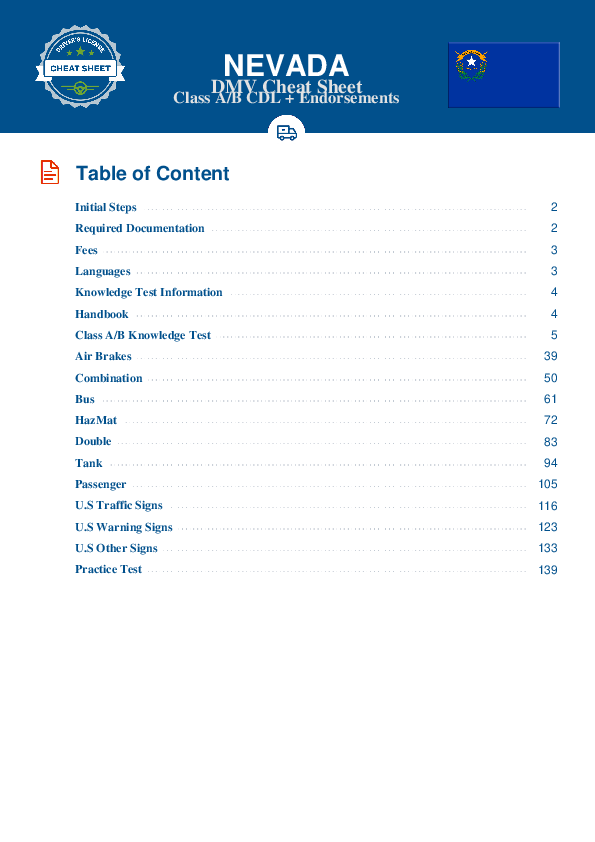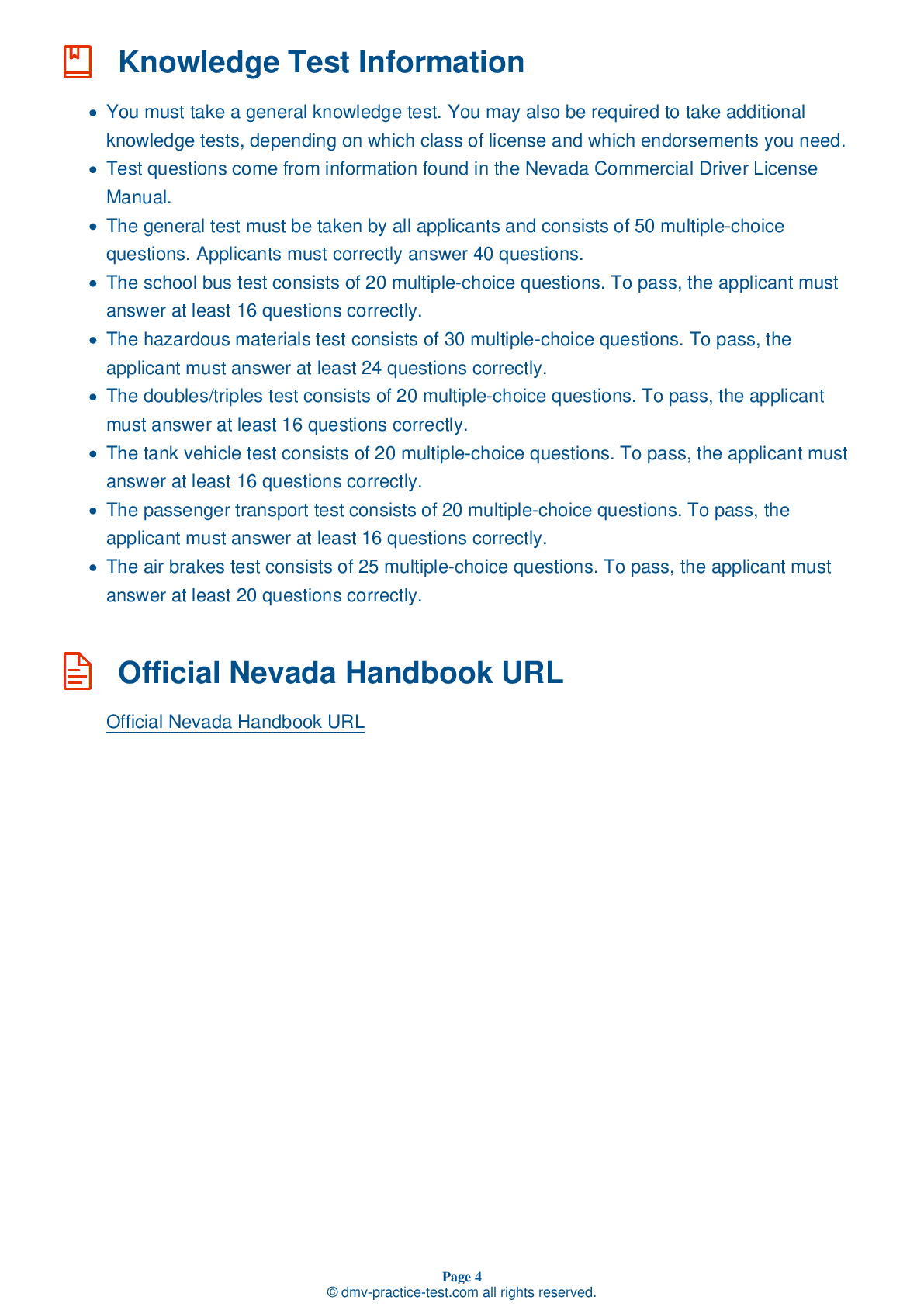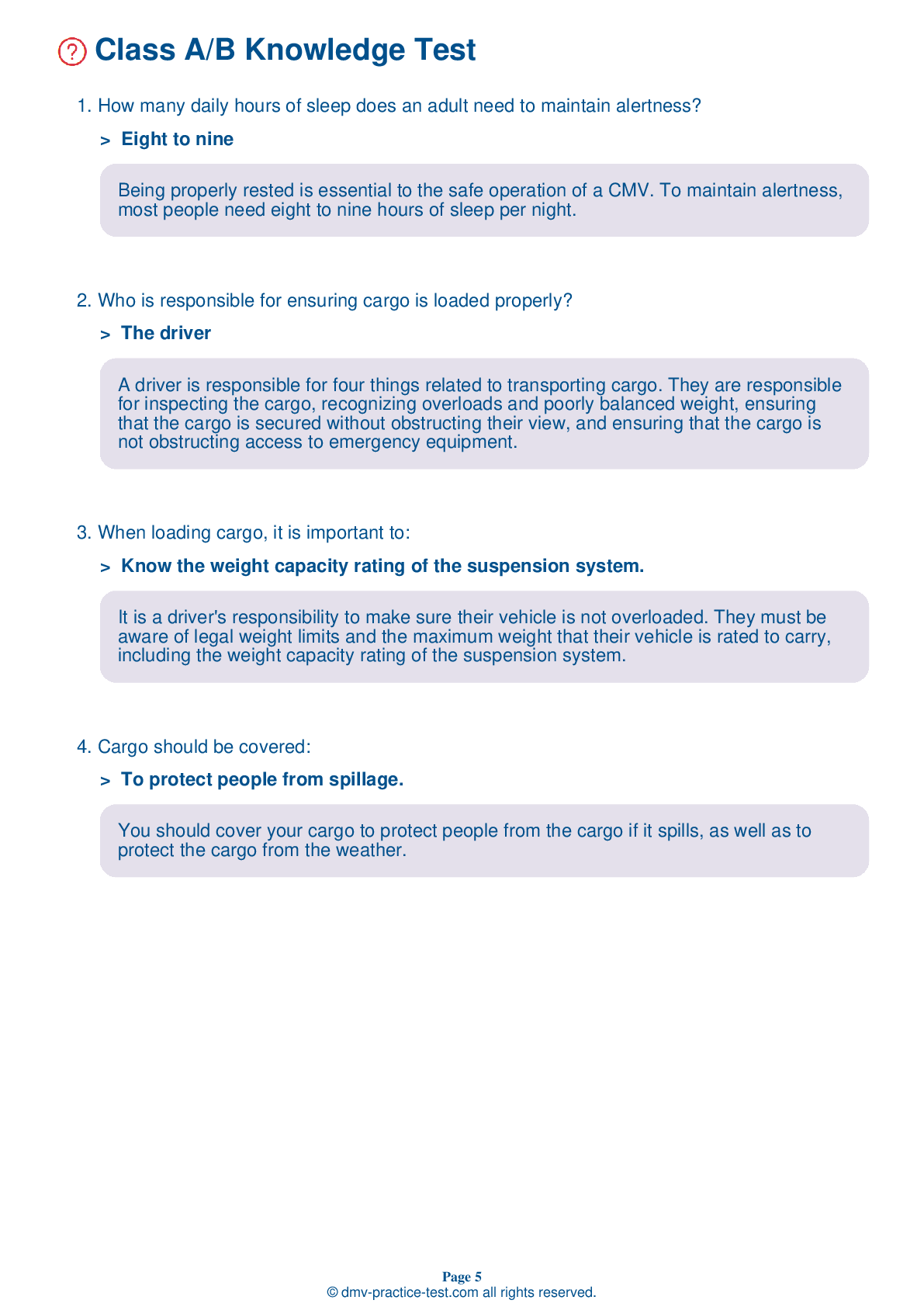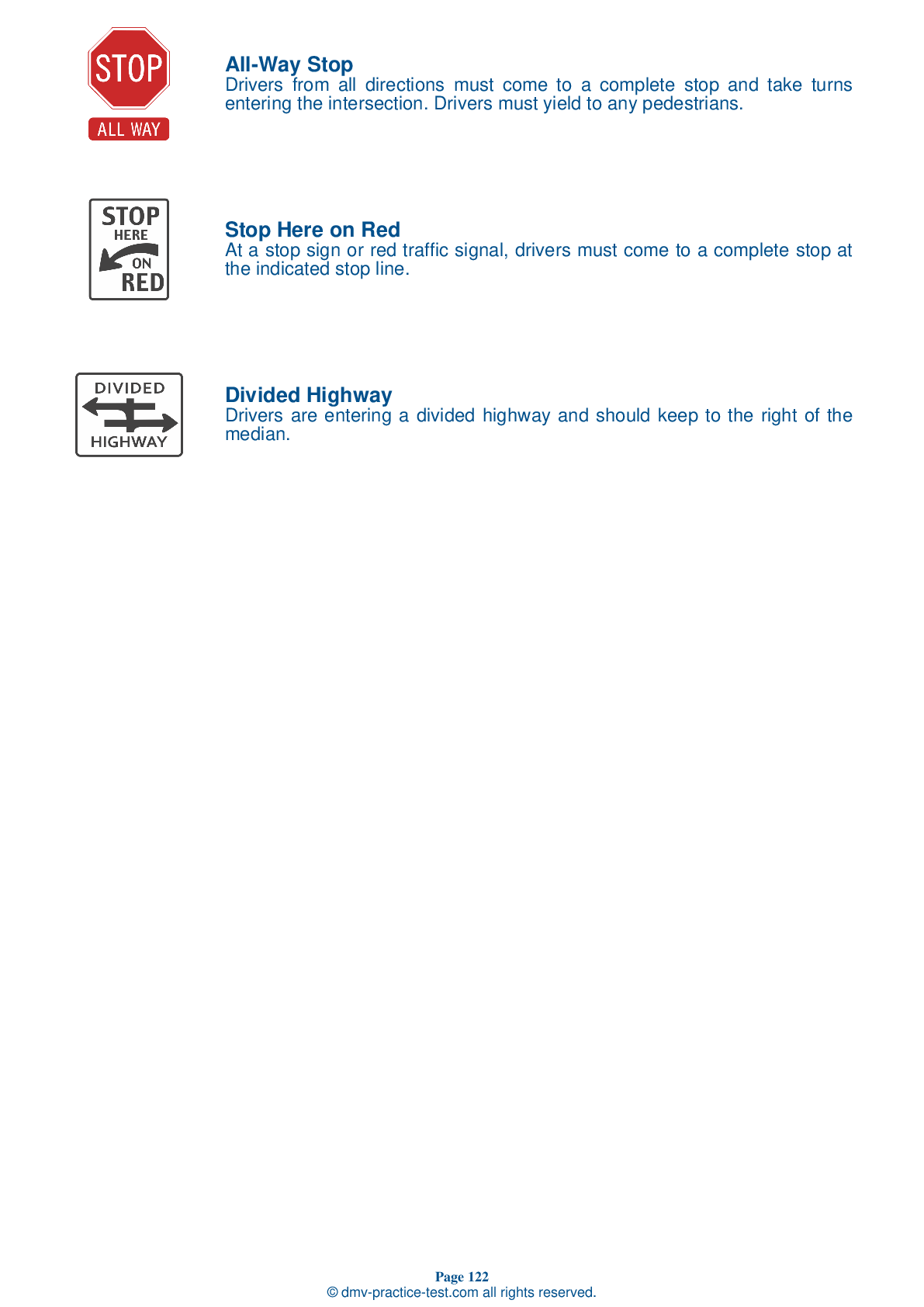Knowledge Test Class A #2
Class A Driving Test | Nevada 2026 #2 Page 2 of 7
Train for FREE online with our Nevada class A license test. The official exam test consists of several obligatory parts, with all of them checking your knowledge of different blocks of road rules. If you need to obtain a NV CDL class A permit in 2026, practice as much as possible. Free sample tests published on our website will help you check and improve your knowledge and boost your grades. Please bear in mind that CDL class A requirements may vary from state to state.
50
40
20
8 . In an emergency, if you must leave the roadway to drive on the shoulder, you should:
Stay on the shoulder until the next exit.
If a hazard requires you to drive onto the shoulder of a road, you should try to keep one set of wheels on the pavement to maintain better control of your vehicle. If possible, stay on the shoulder until your vehicle has come to a complete stop, then pull back onto the road when it is safe to do so.
9 . Hanging meat as cargo is:
An operator should drive with care when transporting a cargo of hanging meat. Such a load is unstable, both because it has a high center of gravity and because the swinging of the meat can affect the driver's handling of the vehicle.
10 . If a load is 10 feet long, it should be secured by a minimum of:
Cargo should be restrained by at least one tie-down for every 10 feet of cargo. However, all cargo should have at least two tie-downs, no matter the size of the cargo.
11 . When stopping in an emergency situation, you should:
If you need to make an emergency stop, you can use either the controlled braking method or the stab braking method. It's important to brake in a way that keeps your vehicle in a straight line but will still allow you to turn if necessary.
12 . You may be denied a HazMat endorsement if:
You do not suffer from a mental illness.
You will be denied a HazMat endorsement, or lose an existing endorsement, if you are not a lawful permanent U.S. resident; you renounce your U.S. citizenship; you are wanted for, under indictment for, or convicted of certain felonies; you are judged as mentally unstable or are committed to a mental institution; or you are deemed to pose a security threat by the Transportation Security Administration (TSA).
13 . The air compressor governor controls:
The speed of the vehicle.
In an air brake system, the air compressor governor controls when the air compressor pumps air into the air storage tanks.
14 . Unsafely reaching for a phone is:
If you must use a mobile phone while driving, it must be in close proximity to you and easily reachable while you are securely fastened into your seat. It is dangerous and non-compliant to unsafely reach for a mobile phone, even if you plan to use a hands-free feature when speaking on the phone.
2026 Nevada | Frequently Asked Questions
To acquire a CDL Passenger endorsement in Nevada, you must first hold a valid Nevada commercial driver's license. Then, you must pass the passenger transport test and a skills test in a vehicle similar to the one you'll be driving. You may also need to pass a background check if you'll be transporting children.
To obtain a CDL Passenger license in Nevada, you must have a valid Nevada CDL. You should be at least 21 years old for interstate travel, or 18 for intrastate. You must pass a written passenger endorsement test and a skills test in the type of vehicle you plan to drive. Also, you need to meet all federal qualifications including a DOT medical card.
Although Nevada doesn't require formal training to obtain a CDL Passenger endorsement, it's recommended. Training programs can help you master the necessary skills and knowledge for the endorsement tests. Practical driving experience is also beneficial, especially in vehicles similar to the one you plan to drive with your CDL Passenger endorsement.
Yes, to obtain a CDL Passenger endorsement in Nevada, you must pass a written passenger transport test. This test focuses on specific knowledge related to carrying passengers, including safety procedures. If you're planning to drive a school bus, you'll also need to pass a separate school bus endorsement test.
During the CDL Passenger endorsement skills test in Nevada, you'll need to demonstrate your ability to inspect your vehicle, check safety equipment, operate the vehicle in various traffic conditions, execute safe turns and stops, and manage railroad crossings. You also need to show your ability to load/unload passengers safely, respond to emergencies, and handle disruptive passengers.
No, it's illegal to transport passengers commercially in Nevada without a valid CDL Passenger endorsement. This endorsement is required for drivers who wish to operate vehicles such as buses or shuttles that can carry 16 or more passengers, including the driver. Violating this rule could result in severe penalties, including fines and suspension of your license.
Yes, you can add the CDL Passenger endorsement to your existing commercial driver's license. To do this, you'll need to pass the passenger transport knowledge test. Once you've passed, the endorsement will be added to your current CDL. You don't need to apply for a new license, but there may be an additional fee.
Yes, there are specific limitations for drivers with a CDL Passenger endorsement in Nevada. These include restrictions on blood alcohol content, which must be below .04%. Drivers are also subject to random drug and alcohol testing. They must also comply with hours-of-service regulations, limiting the number of hours they can drive without rest periods. Violations can lead to suspension or revocation of the endorsement.
Yes, there are age-related prerequisites for acquiring the CDL Passenger endorsement in Nevada. You must be at least 21 years old to drive a commercial vehicle across state lines or to transport hazardous materials. However, you can obtain a CDL Passenger endorsement at the age of 18, but can only operate within the state of Nevada until you turn 21.
With a CDL Passenger endorsement in Nevada, you'll be eligible to operate vehicles such as buses, shuttle vans, or any vehicle designed to transport 16 or more passengers, including the driver. This endorsement also allows you to drive school buses, provided you have an additional School Bus endorsement. It does not cover operation of vehicles like trucks or tractor-trailers.



